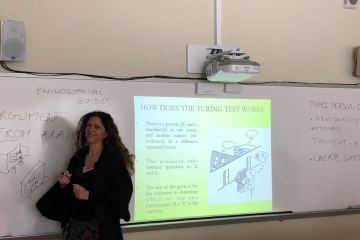By Vivian Ng (Gr. 11)
In Theory of Knowledge classes, we are introduced to the different areas of knowledge, including natural sciences, mathematics, the arts, as well as the ways of knowing, i.e. “how we know what we know”. Through studying in depth about knowledge and how it is acquired through our learning, I have become more aware of the process of knowledge acquisition in our everyday learning.
Today, we had a guest lecturer from University of Macau speak to our class, Dr. Nevia Dolcini, a philosophy professor. The topic of the presentation was “Can machines think?”. In this century when artificial intelligence technology has advanced as well as caused more debates than ever before, it is very interesting to debate whether or not machines and robots can have their own thoughts. Dr. Dolcini introduced us to the Turing Test and why the mathematician himself believed that machines could think, and we discussed the validity of such tests. We also looked into a lot of philosophical terms or ideas such as “philosophical zombies”, which refers to an individual behaving in a way as if it can think, react and feel, yet is not at all conscious of any mental activity.
This presentation definitely raised my awareness of whether or not machines can have minds that can generate their own thoughts. Though this presentation has not made me change my mind that machines cannot think, it did give me more insight into how it is possible to consider that machines may have the capability of generating thoughts and behaving in the exact same way a human does. Though the core question “Can machines think?” was not directly answered, Dr. Dolcini led us to more questions and into thinking about the “mind”, both the real one and the artificial one, how it works and how we can know so.
(Vivian Ng is in Grade 11 and a member of the full International Baccalaureate cohort where Theory of Knowledge is one of the core classes.)

